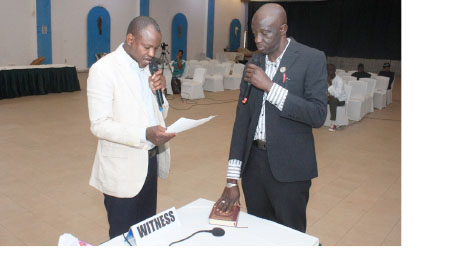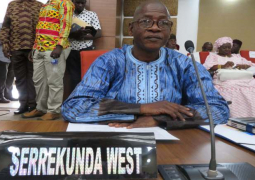
The continuation of Ceesay’s testimony on this fateful day brought to light more alarming issues that have plagued the local government institution.
Ceesay, recommencing his testimony as he took the stand, acknowledged that the Mansakonko Area Council had failed to produce financial statements, attributing the lapse to a significant capacity gap within the council.
He elaborated on the dire situation by disclosing that he had personally written to Bai Gibbi Sallah, the director of finance at the time, urging him to provide the much-needed financial statements.
Two crucial letters were tendered before the Commission. One of the letters, dated 6 May 2020, was authored by Baba Jarjusey, the director of internal audit at the council, titled "reminder." In this missive, Jarjusey explicitly requested essential financial documents, including cash books, journals, ledgers, bank statements, cheque books, and deposit slips.
The second letter, dated 7 May 2020, was authored by Ceesay himself in response to a request from the National Assembly Select Committee on Local Government, demanding the production of financial statements.
Ceesay revealed that he possessed additional letters directed to the Director of Finance, expressing his concern and frustration over the lack of financial transparency. Promising to present these letters the following day, he argued that the then director of finance lacked the necessary capacity, leading to Ceesay's reluctance to confirm his appointment after a six-month assessment.
“After my assessment after 6 months confirmed to me that the Director of Finance lacked capacity and this was why I could not confirm his appointment,” he said.
The former CEO also raised the nonexistence of a proper record-keeping system at the council due to a lack of a records unit. He said the minutes of the committee’s meetings were missing owing to the nonexistence of a good record-keeping system.
Another pressing issue highlighted by the former CEO was the refusal of lodges in the region to pay taxes to the councils. Ceesay attributed this challenge to the misinterpretation of Section 21 Subsection 2 of the Local Government Finance and Audit Act. The law provides that levy, charge and collect fees and tax, excluding rates, payable in the Tourism Development Areas, shall be paid to The Gambia Tourism Authority.
“All the councils are facing this problem. The lodges and hotels are refusing to pay taxes to the councils,” he said.
He appealed to the Commission to address this matter promptly, arguing that the law is being misinterpreted as it did not explicitly exempt hotels or lodges from paying taxes to the councils.
Expressing his distress over the situation, Ceesay disclosed that he had informed both the Ministry of Local Government and the Local Government Service Commission about the capacity gaps in the council. Despite his efforts to draw attention to the finance director's incompetence and the malfunctioning finance department, Ceesay claimed that he received no replies to his letters.
“I informed them that the finance department was not functioning and they did not take steps. I told them that the finance director was not competent,” he said.
To that end, he expressed dismay that the Local Government Service Commission confirmed Bai Gibba Sallah's appointment despite his letters which raised competency issues.
Read Other Articles In Headlines




